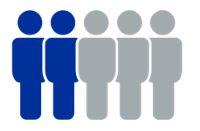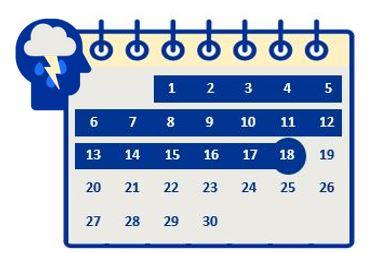Mental Health Support Needed for Transgender Adults with Disabilities
Everyone has a gender identity, including men, women, people who are neither men nor women, and people who are both.
Transgender person

DIfferent gender identity from what
they were called at birth
Cisgender person

Same-gender identity as what
they were called at birth
2 in 5

NH adults who are transgender have a disability
Adults who are transgender are 2 times more likely to have a disability than adults who are cisgender. This includes one or more disabilities related to mobility, cognition, vision, hearing, and more. People who belong to more than one social group, like people with disabilities who are also transgender, often have more physical and mental health risks.
Mental Health
When adults were asked about stress, depression, and problems with emotions in the last 30 days, people who were cisgender had fewer bad days (9 days) than people who were transgender (13 days). People with disabilities who were also transgender had the most mentally unhealthy days (18 days).
"The way others treat me based on my gender identity has negatively impacted my mental health at times... it has made me anxious about going out in the world."
- Transgender person with a disability
Average number of bad mental health days in the last month

Cisgender: 9 days

Transgender: 13 days

Transgender with Disability: 18 days

Strategies to Support the Mental Health of People with Disabilities Who Are Transgender:
- Avoid making assumptions about gender identity. Ask which pronouns people use to describe themselves (for example: he, she, they, and others);
- Update data collection forms and electronic health record systems, so that people can include the name, gender identity, and pronouns they use;
- Become a transgender ally by practicing these tips from the National Center for Transgender Equality;
- Connect with transgender-specific mental health resources. The National Alliance on Mental Illness New Hampshire has many resources available;
- Contact the NH Disability & Public Health Project with questions about cultural competence, accessibility and inclusion for people with disabilities who are also part of other social groups.
"All healthcare professionals should know to ask about pronouns. It signals to the patient that it's safe to open up and discuss healthcare needs."
- Transgender person with a disability

DOWNLOAD THE DATA BRIEF HERE.
Data source: 2019 NH Behavioral Risk Factor Surveillance System (BRFSS), available through the CDC.
This content is solely the responsibility of the NH Disability & Public Health Project and does not necessarily represent the views of the CDC or US DHHS.